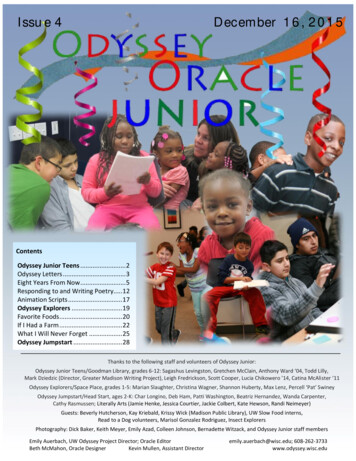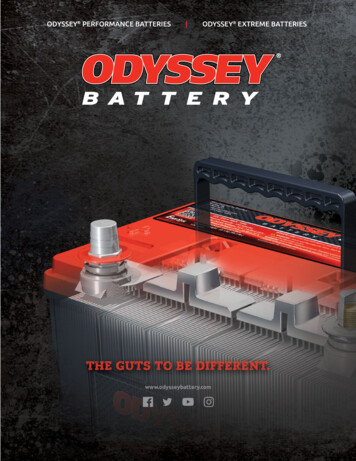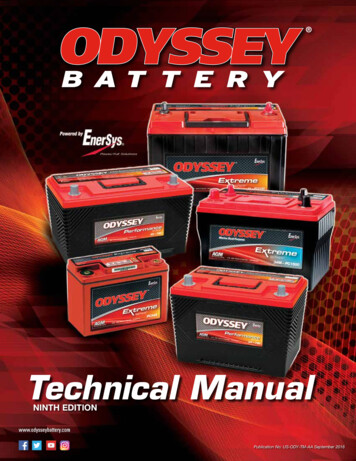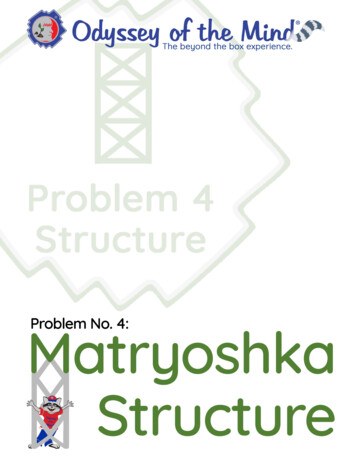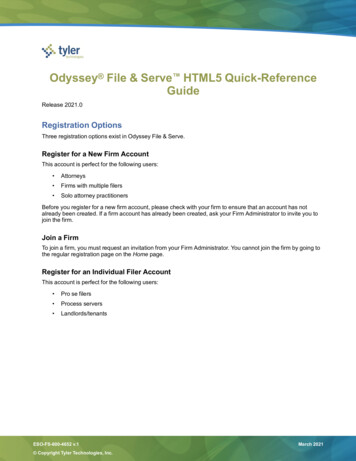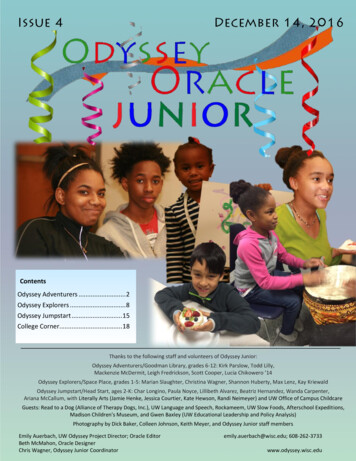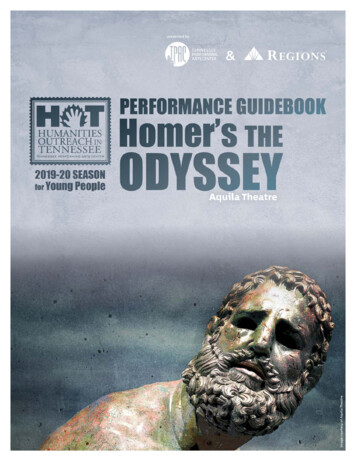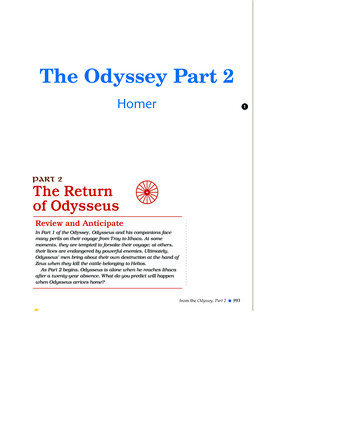
Transcription
-1'3 1'-, 1 - 1 -: ,1("(. 1(-, 2(# H C5@4@41 2;88;C5:3 ?@-@191:@? I 1; 81 -:D5;A?8E -C-5@ 2; @415 2-958E 919.1 ? @; 1@A : 4;91 4HE /DYSSEY 0ART (OMERI '41 59 ; @-:@ @45:3? 5: ;:1 ?4;91 C588 :1B1 /4-:31 :; 9-@@1 4;C 8;:3 E;A ?@-E -C-E I ;A ?4;A80 :1B1 @ A?@ 1; 81 @; 19-5: 2-5@42A8 @; E;A 919; E 52E;A 4-B1 .11: 3;:1 2; - 8;:3@591 I ;A /-: :1B1 3; 4;91 -3-5: 5B1 ?@A01:@? /; 51? ;2 @41 1 - 10 :@5/5 -@5;: A501 -B1 ?@A01:@?9- 7 @415 1? ;:?1? 5: @41 !1 /;8A9: '41: 4-B1 ?@A01:@? 05?/A?@41 ?@-@191:@? 5: -5 ? ; 3 ;A ? -:09- 7 @41 A501? -3-5: @45? @591 5:@41 ;A /;8A9: -," .1 -,, "1-/&@A01:@? C588 1@A : @; @41 :@5/5 -@5;: A501 -2@1 /;9 81@5:3@41 - @ /,',% -# *'1' 0 ,1 /. /0-, * /, /0 ' ! ' '! ' % " ' ' ' ' ' %' ' '! '# % ' ' %'! ' ! ' !' ' ! '! %' '! ! '! ' '! '# % ' !' ! '! ' # ' ' ' %' " ' ' ! ! % ' % " & ' ' "!'! ' ' ! " ! ' !'! ' ' ' " ' '! %' '! ' !! ' '! ' ' ! ' ' % " ' ' ' ' ' ' ! ' ! ' '! !%(% ' ' !' '% "' !' ' ' ' % " ' # ' 2.-/1 %-/ *-4 3 * 12# ,10 ,(1 0-2/" 0 -" !2* /6 / 2. -/# (010 -" !2* /6 / 2. / "1(" #(,& / 2. * "1(-, 01 H / .'(" /& ,(7 / / ,0. / ,"( 0 #(,& )(** / .'(" /& ,(7 / / ,0. / ,"6 1E ?/1:1? 5: @41 - @ 2;/A? ;: @1?@?K#0E?1A? @1?@? 1; 81 @; ?11 C41@41 @41E 4-B1 19-5:10 2-5@42A8 @; 459 1:18; 1@1?@? #0E?1A? @; ?11 C41@41 41 5?@ A8E C4; 41 /8-59? @; .1 ?7 @41?1?@A01:@? @; /;:?501 @41 A:?@-@10 A81? @4-@ 3;B1 : 5:@1 -/@5;:?.1@C11: 1; 81 1? 1/5-88E 5: 18- @5;:?45 ? @4-@ 1 A5 1 @ A?@ -B1 ?@A 01:@? 01?/ 5.1 -: 1:/;A:@1 5: C45/4 1; 81 4-B1 @1?@10 ;:1 -:;@41 @;25:0 ;A@ C4-@ @41E 7:;C C4; @41E- 1 ; C41@41 @41E ?4;A80 .1@ A?@10 2.-/1 %-/ ,&*(0' /, /0 ,(1 0-2/" 0 -" !2* /6 / 2. -/# (010 -" !2* /6 / 2. / "1(" #(,& / 2. # / 0 -1 !--) ,&*(0' /, / 0 /0(-, (01 ,(,& 1- (1 / 12/ 2#(- # / 0 -1 !--) # .1 # /0(-,# .1 # # / 0 -1 !--) 2#(-
2About the SelectionOf the two great epic poems attributed to Homer, the Iliad has beencalled a war poem, and the Odysseyhas been called a postwar poem. Thewanderings of Odysseus after hisvictory at Troy and the difficulties ofreadjusting to a civil society upon hiseventual return home have helpedmake the themes of the Odyssey relevant to many generations of readers.The theme of the returning veteran,with the struggles to reestablish relationships with spouses and friends(and perhaps with a child for the firsttime) add a human poignancy to thisepic adventure. Discuss with studentsthe difficulties and emotions thatOdysseus is likely to face after twentyyears away.32Odysseus has finished telling his story to the Phaeacians. Thenext day, young Phaeacian noblemen conduct him home byship. He arrives in Ithaca after an absence of twenty years.The goddess Athena appears and informs him of the situationat home. Numerous suitors, believing Odysseus to be dead,have been continually seeking the hand of his wife, Penelope,in marriage, while overrunning Odysseus’ palace andenjoying themselves at Penelope’s expense. Moreover, they areplotting to murder Odysseus’ son, Telemachus, before he caninherit his father’s lands. Telemachus, who, like Penelope, stillhopes for his father’s return, has journeyed to Pylos andSparta to learn what he can about his father’s fate. Athenadisguises Odysseus as a beggar and directs him to the hut ofEumaeus,1 his old and faithful swineherd. While Odysseusand Eumaeus are eating breakfast, Telemachus arrives.Athena then appears to Odysseus.Reading CheckAnswer: Athena tells Odysseus thatthere are many suitors at the palacetrying to persuade Penelope thatOdysseus is surely dead after all thistime, and so she must marry again.Each wants to be her new husband.Athena tells Odysseus that it is timehe put an end to all this.“Twenty years gone, and I am back again . . .”1000100510101015994 . . . From the airshe walked, taking the form of a tall woman,handsome and clever at her craft, and stoodbeyond the gate in plain sight of Odysseus,unseen, though, by Telemachus, unguessed,for not to everyone will gods appear.Odysseus noticed her; so did the dogs,who cowered whimpering away from her. She onlynodded, signing to him with her brows,a sign he recognized. Crossing the yard,he passed out through the gate in the stockadeto face the goddess. There she said to him:“Son of Laertes and the gods of old,Odysseus, master of landways and seaways,dissemble to your son no longer now.The time has come: tell him how you togetherwill bring doom on the suitors in the town.I shall not be far distant then, for Imyself desire battle.”Saying no more,she tipped her golden wand upon the man,making his cloak pure white, and the knit tunicfresh around him. Lithe and young she made him,Vocabulary Builderdissemble (di sem»bßl) v. conceal undera false appearance;disguise3What does Athenareveal to Odysseusabout the situation hewill find at home?Themes in Literature: HeroismThink-Aloud: ContextDirect students’ attention to the dogs’ behaviorat the appearance of Athena on this page: theycowered at the sight of the goddess. Using athink-aloud process, model how to use contextto infer the meaning of an unknown word.The dogs cowered because theysee Athena. In the same sentence,they also whimper, or cry,9941. Eumaeus (yØ mè« ßs)and seem to run away from her.Are there any more clues? Well, Athenais a goddess and very powerful. Thedogs might be afraid and run away froma powerful person. I think that to cowermeans to show fear before a powerfulperson or thing.
4HumanitiesEumaeus, the Swineherd, byN.C. WyethThis illustration, like many for thisselection, was among the sixteenpaintings N.C. Wyeth, America’s foremost illustrator of children’s booksand classics, painted for a 1929 edition of the Odyssey. Use the followingquestions for discussion:1. In the Odyssey, Eumaeus ischaracterized as being loyal andnoble. How does Wyeth’s painting convey these traits?Possible response: Eumaeus ispictured as tall, straight, andsturdy. He looks like a man whowill not be easily moved. Thisfirmness of his stance makes himlook trustworthy.42. Which dog in the illustrationmight be Argus?Possible response: Argus isdescribed in lines 1163–1168 as“an old dog lying near.” Arguswould be the dog on the left,lying down.5Critical ViewingPossible Response: Eumaeusappears to be patient, loyal, andpractical. The pigs in the sty behindhim are a clue to his profession.5Critical Viewing What can you tell about Eumaeus from thisillustration? [Infer]from the Odyssey, Part 2Strategy for Less Proficient ReadersHave partners paraphrase the opening passagethat describes the entrance of Athena. Apossible paraphrase might be: “The goddessAthena, looking like a beautiful, intelligentwoman, appeared to Odysseus. Telemachus,however, could not see her.” 995Strategy for English LearnersStudents may find the appearance of a goddessin this scene challenging. Explain that gods andgoddesses often appear in human form inGreek literature. Tell them that readers wouldbe familiar with this convention, as well as withthe Telemachus’ inability to see the god,although his father sees her plainly. Askstudents to identify details that emphasizeAthena’s godlike qualities—for example, herheight and the dogs’ fear of her—and thedetails that make her seem more like a humanbeing.995
6Reading SkillHistorical and CulturalContext Tell students that the Greeksbelieved their gods often intervened in the affairs of humanbeings, taking an interest in theirwelfare and helping or hinderingthem. Remind them of the godswho have made Odysseus’ journeyback to Ithaca so difficult. Ask students the Reading Skillquestion: What lines 1021–1029suggest about the way ancientGreeks responded to the presenceof a god?Possible response: Taking thetransformed Odysseus for a god,Telemachus shows awe, fear, andreverence. However, he also speaksfreely to the “god,” and makesrequests. These lines suggest thatGreeks responded to the gods ashigher, but approachable, beings.1020610251030ruddy with sun, his jawline clean, the beardno longer gray upon his chin. And shewithdrew when she had done.Then Lord Odysseusreappeared—and his son was thunderstruck.Fear in his eyes, he looked down and awayas though it were a god, and whispered:“Stranger,you are no longer what you were just now!Your cloak is new; even your skin! You areone of the gods who rule the sweep of heaven!Be kind to us, we’ll make you fair oblation2and gifts of hammered gold. Have mercy on us!”2. oblation (äb là» §ßn)n. offering to a god.The noble and enduring man replied:“No god. Why take me for a god? No, no.I am that father whom your boyhood lackedand suffered pain for lack of. I am he.”1035104010451050996 Held back too long, the tears ran down his cheeksas he embraced his son.Only Telemachus,uncomprehending, wildwith incredulity, cried out:“You cannotbe my father Odysseus! Meddling spiritsconceived this trick to twist the knife in me!No man of woman born could work these wondersby his own craft, unless a god came into itwith ease to turn him young or old at will.I swear you were in rags and old,and here you stand like one of the immortals!”Vocabulary Builderincredulity (in« krß dØ»lß tè) n. unwillingnessor inability to believeOdysseus brought his ranging mind to bearand said:“This is not princely, to be sweptaway by wonder at your father’s presence.No other Odysseus will ever come,for he and I are one, the same; his bitterfortune and his wanderings are mine.Twenty years gone, and I am back againon my own island.Themes in Literature: HeroismWord FormsTwo of the Vocabulary Builder words for theOdyssey can form other parts of speech byadding suffixes. Give students a blank WordForm Chart (General Resources, p. 16) withdissemble and incredulity in the correct columns.Work with the class, or have students work withNoundissemblerincredulity996Reading SkillHistorical andCultural ContextWhat do lines 1021–1029 suggest aboutthe way ancientGreeks respondedto the presence ofa god?Verbdissemblea partner, to determine the related forms. Thefinal chart should look like the one shown.Hold students accountable for integratingthe related forms of the words into their speaking and mblinglyincredulously
10557As for my change of skin,that is a charm Athena, Hope of Soldiers,uses as she will; she has the knackto make me seem a beggar man sometimesand sometimes young, with finer clothes about me.It is no hard thing for the gods of heavento glorify a man or bring him low.” Remind students that an epic simileis a device to help describe what ishappening in the Odyssey. Beyondthat, however, an epic simileunderscores the drama of theaction and paints vivid images inthe reader’s mind.When he had spoken, down he sat.Then, throwing1060710651070Literary AnalysisEpic Similehis arms around this marvel of a fatherTelemachus began to weep. Salt tearsrose from the wells of longing in both men,and cries burst from both as keen and flutteringas those of the great taloned hawk,whose nestlings farmers take before they fly.So helplessly they cried, pouring out tears,and might have gone on weeping so till sundown,had not Telemachus said:Literary AnalysisEpic Simile To whatare Odysseus’ andTelemachus’ criescompared in theepic simile in lines1063-1065? Ask students the Literary Analysisquestion: To what are Odysseus’and Telemachus’ cries compared inthis epic simile?Answer: The cries of Odysseusand Telemachus are compared tothose of a hawk that has lost itsnestlings to a farmer.8Reading CheckAnswer: Telemachus is initiallydoubtful because of the change inOdysseus’ appearance, which leadsTelemachus to assume he is a god.“Dear father! Tell mewhat kind of vessel put you here ashoreon Ithaca? Your sailors, who were they?I doubt you made it, walking on the sea!”Then said Odysseus, who had borne the barren sea:107510801085“Only plain truth shall I tell you, child.Great seafarers, the Phaeacians, gave me passageas they give other wanderers. By nightover the open ocean, while I slept,they brought me in their cutter,3 set me downon Ithaca, with gifts of bronze and goldand stores of woven things. By the gods’ willthese lie all hidden in a cave. I cameto this wild place, directed by Athena,so that we might lay plans to kill our enemies.Count up the suitors for me, let me knowwhat men at arms are there, how many men.I must put all my mind to it, to seeif we two by ourselves can take them onor if we should look round for help.”Telemachusreplied:3. cutter (kut»ßr) n. small,swift ship or boat carriedaboard a large ship to transport personnel or supplies.8Why is Telemachusinitially doubtful thatthe man before him isOdysseus, his father?from the Odyssey, Part 2 997Strategy for Less Proficient ReadersSome readers may need help following the timespan covered by Odysseus’ lengthy journey.Display the Timeline (Graphic OrganizerTransparencies, p. 242) and have students chartsome of the important events that occurred inthe Odyssey in the twenty years between theend of the Trojan War and Odysseus’ return toIthaca. Remind students to plot events thatOdysseus tells about long after they happen—such as the arrival of the suitors.997
9Reading SkillHistorical and CulturalContext Remind students that Athena wasthe goddess of wisdom. Then askstudents why she might be particularly interested in helpingOdysseus.Possible response: Odysseus isknown for his wit and cleverness.Athena, the goddess of wisdom,may admire his intelligence. Then ask students the ReadingSkill question: What does Odysseus’statement in lines 1109–1111suggest about ancient Greek beliefsabout the gods’ interest in humanaffairs.Possible response: Odysseus’response indicates that the Greeksbelieved they could depend on thegods to help them in very specificways in time of need. Discuss with students how Homer’sstory shows the Greek godsresponding to humans’ materialneeds in very active ways. In thissection, for example, Athena hasdisguised Odysseus and thenrestored him to his youthfulappearance.109010951100110591110“O Father, all my life your fameas a fighting man has echoed in my ears—your skill with weapons and the tricks of war—but what you speak of is a staggering thing,beyond imagining, for me. How can two mendo battle with a houseful in their prime?4For I must tell you this is no affairof ten or even twice ten men, but scores,throngs of them. You shall see, here and now.The number from Dulichium aloneis fifty-two picked men, with armorers,a half dozen; twenty-four came from Same,twenty from Zacynthus; our own islandaccounts for twelve, high-ranked, and their retainers,Medon the crier, and the Master Harper,besides a pair of handymen at feasts.If we go in against all theseI fear we pay in salt blood for your vengeance.You must think hard if you would conjure upthe fighting strength to take us through.”Odysseuswho had endured the long war and the seaanswered:“I’ll tell you now.Suppose Athena’s arm is over us, and Zeusher father’s, must I rack my brains for more?”Clearheaded Telemachus looked hard and said:111511201125998 “Those two are great defenders, no one doubts it,but throned in the serene clouds overhead;other affairs of men and gods they haveto rule over.”Reading SkillHistorical andCultural ContextWhat does Odysseus’statement in lines1109–1111 suggestabout ancient Greekbeliefs about thegods’ interest inhuman affairs?And the hero answered:“Before long they will stand to right and left of usin combat, in the shouting, when the test comes—our nerve against the suitors’ in my hall.Here is your part: at break of day tomorrowhome with you, go mingle with our princes.The swineherd later on will take me downthe port-side trail—a beggar, by my looks,hangdog and old. If they make fun of mein my own courtyard, let your ribs cage upThemes in Literature: HeroismVocabulary Builder ReinforcementStudents will benefit from additional examplesand practice with the Vocabulary Builder words.Reinforce their comprehension with “show-youknow” sentences. The first part of the sentenceuses the vocabulary word in an appropriatecontext. The second part of the sentence—the“show-you-know” part—clarifies the first.Model the strategy with the example forbemusing:The bemusing air in the garden made us sleepywith its odor of sweet flowers.9984. in their prime in the best ormost vigorous stage of theirlives.Then give students these sentence prompts andcoach them in creating the clarification part.1. The bemusing singer drew us in with heramazing voice;Sample answer: her songs lulled us intoforgetting all our troubles.2. We questioned the equity of the law;Sample answer: it seemed to favor onegroup of people over another.
10101130113511401145115011551160your springing heart, no matter what I suffer,no matter if they pull me by the heelsor practice shots at me, to drive me out.Look on, hold down your anger. You may evenplead with them, by heaven! in gentle termsto quit their horseplay—not that they will heed you,rash as they are, facing their day of wrath.Now fix the next step in your mind.Athena,counseling me, will give me word, and Ishall signal to you, nodding: at that pointround up all armor, lances, gear of warleft in our hall, and stow the lot awayback in the vaulted storeroom. When the suitorsmiss those arms and question you, be softin what you say: answer:Cultural ConnectionAthena Athena was the goddess ofwisdom, skills, and warfare. Whenshe helps Odysseus in this epic, it isnot the first time that she offersassistance to a Greek hero. InHomer’s Iliad, Athena helps theGreek hero Achilles defeat theTrojan warrior Hector. Athenafavored Achilles for his unmatchedskill in battle, but Odysseus was herfavorite among the Greeks. Hedisplayed not only skill in warfare,but also ingenuity and cunning.Which of Odysseus’ deeds in theOdyssey might have helped him toearn Athena’s favor? Explain.‘I thought I’d move themout of the smoke. They seemed no longer thosebright arms Odysseus left us years agowhen he went off to Troy. Here where the fire’shot breath came, they had grown black and drear.One better reason, too, I had from Zeus:suppose a brawl starts up when you are drunk,you might be crazed and bloody one another,and that would stain your feast, your courtship. Temperediron can magnetize a man.’Say that.But put aside two broadswords and two spearsfor our own use, two oxhide shields nearbywhen we go into action. Pallas AthenaVocabulary Builderand Zeus All-Provident will see you through,bemusing (bè myØz»bemusing our young friends.i ) v. stupefying ormuddlingNow one thing more.If son of mine you are and blood of mine,5. shirkers (§†rk» ßrz)let no one hear Odysseus is about.n. people who get out of doingwhat needs to be done.Neither Laertes, nor the swineherd here,nor any slave, nor even Penelope.11But you and I alone must learn how farthe women are corrupted; we should knowHow does Odysseushow to locate good men among our hands,tell his son to respondthe loyal and respectful, and the shirkers5if the suitors “practiceshots” on Odysseus?who take you lightly, as alone and young.”from the Odyssey, Part 2Strategy for Special Needs StudentsStudents may need additional support andpractice with the Reading Skill, Historical andCultural Context. Explain that many detailswithin the text offer insight into the way Greekslived at the time of Homer. For example,Odysseus’ instructions to hide weapons fromthe suitors (lines 1137–139) reveals how much“gear of war” was stored in a house at anytime. Literature in ContextCultural Connection The Greekshad more than one god whom theybelieved was assigned to war. Thegod Ares represented the spirit ofbattle—a grimmer, bloodier side ofwar than that associated withAthena. Her association was morewith the intellectual and civilized sideof war, which she combined with thevalues of justice and skill. Athena wasassociated with war, but she was alsoa keeper of civilization, as shown byher namesake city, Athens, the birthplace of democracy.Connect to the LiteratureRemind students of Odysseus’ earlyclaim that he is “formidable for guilein peace and war” (line 19). Thenask the Connect to Literature question: Which of Odysseus’ deeds inthe Odyssey might have helped himto earn Athena’s favor? Explain.Possible response: Athena mayhave been impressed by Odysseus’clever thinking as he escaped fromthe Cyclops. She may have appreciated how his escape required bothintelligence and physical strength.11Reading CheckAnswer: If the suitors “practiceshots” on Odysseus, who is pretending to be a beggar, Telemachus is tohold his anger and refrain fromacknowledging his father.999To model how to analyze the historical andcultural context, show students Reading SkillGraphic Organizer B (Graphic OrganizerTransparencies, p. 204) The completed chartwill give students insight into the process ofanalyzing a story’s context. They can use it as amodel for their own analysis as they read.999
12Critical ViewingArgusAnswer: Students may say that theGreeks incorporated worship of theirgods into everyday events. Thescenes on the pottery show theimportance to the Greeks ofhonoring and commemoratingsignificant events in Greek historyand mythology.Odysseus heads for town with Eumaeus. Outside the palace,Odysseus’ old dog, Argus, is lying at rest as his long-absentmaster approaches.While he spokean old hound, lying near, pricked up his earsand lifted up his muzzle. This was Argus,trained as a puppy by Odysseus,but never taken on a hunt beforehis master sailed for Troy. The young men, afterward,hunted wild goats with him, and hare, and deer,but he had grown old in his master’s absence.Treated as rubbish now, he lay at lastupon a mass of dung before the gates—manure of mules and cows, piled there untilfieldhands could spread it on the king’s estate.Abandoned there, and half destroyed with flies,old Argus lay.But when he knew he heardOdysseus’ voice nearby, he did his bestto wag his tail, nose down, with flattened ears,having no strength to move nearer his master.And the man looked away,wiping a salt tear from his cheek; but hehid this from Eumaeus. Then he said:116513HumanitiesGreek vesselThis vessel is one of several beingused to illustrate this edition of theOdyssey. The Greeks used this vesselto store or transport liquids such asoil or wine. Greek artists used severalmethods to decorate these vessels. Inthe “black figure” technique, color isapplied to the figures, with the background taking the natural color ofthe clay. The vessel on p. 1000 is anexample this style. In the “red figure”technique, the process is reversed;the background is painted black. Thekrater, or bowl, on p. 972 is an example of the “red figure” process.”These artifacts have survived forthousands of years—a durable artform that is not only intrinsicallybeautiful, but that presents a detailedpicture of the life and culture ofancient Greeks. Use the followingquestion for discussion: In a thousand years, what objectsfrom our own culture might revealour values to the people who findthem?Possible response: Our televisions, computers, and musicalequipment might indicate our culture’s interest in entertainment.117011751180“I marvel that they leave this hound to liehere on the dung pile;he would have been a fine dog, from the look of him,though I can’t say as to his power and speedwhen he was young. You find the same good buildin house dogs, table dogs landowners keepall for style.”1185And you replied, Eumaeus:“A hunter owned him—but the man is deadin some far place. If this old hound could showthe form he had when Lord Odysseus left him,going to Troy, you’d see him swift and strong.He never shrank from any savage thinghe’d brought to bay in the deep woods; on the scent119011951000100013 Themes in Literature: Heroism12Critical ViewingWhat can you inferabout the ancientGreeks based on thefact that they depictedtheir gods on everydayobjects like this urn?[Infer]
14no other dog kept up with him. Now miseryhas him in leash. His owner died abroad,and here the women slaves will take no care of him.You know how servants are: without a master1200they have no will to labor, or excel.14 For Zeus who views the wide world takes awayhalf the manhood of a man, that dayhe goes into captivity and slavery.”1205Eumaeus crossed the court and went straight forwardinto the megaron6 among the suitors:but death and darkness in that instant closedthe eyes of Argus, who had seen his master,Odysseus, after twenty years.Historical and CulturalContext6. megaron (meg« ß rön)n. great, central hall of thehouse, usually containing acenter hearth. Then ask the Reading Skill question: How do Eumaeus’ beliefsabout servitude and slavery compare with those of your culture?Sample responses: Eumaeusbelieves that slaves will not dogood work if they are not supervised. My culture believes thatenslaving people is morally wrongand that no one should be subjected to slavery, even if it is undera “good” master such as Odysseus.The SuitorsStill disguised as a beggar, Odysseus enters his home. He isconfronted by the haughty7 suitor Antinous.8Reading SkillReading SkillHistorical andCultural ContextHow do Eumaeus’beliefs aboutservitude and slaverycompare with those ofyour own culture?7. haughty (hôt» è) adj.arrogant.8. Antinous (an tin« ò ßs) Discuss with students how manycultures have practiced slavery,often enslaving people that werecaptured in war. Slavery based onrace was practiced in Americancolonies and in the United Statesuntil the Civil War.But here Antinous broke in, shouting:15“God!12101215Reading CheckAnswer: Antinous berates Odysseusand throws a stool at him.What evil wind blew in this pest?Get over,stand in the passage! Nudge my table, will you?Egyptian whips are sweetto what you’ll come to here, you nosing rat,making your pitch to everyone!These men have bread to throw away on youbecause it is not theirs. Who cares? Who sparesanother’s food, when he has more than plenty?”With guile Odysseus drew away, then said:“A pity that you have more looks than heart.You’d grudge a pinch of salt from your own larderto your own handyman. You sit here, fat16 on others’ meat, and cannot bring yourselfto rummage out a crust of bread for me!”12201225Then anger made Antinous’ heart beat hard,and, glowering under his brows, he answered:15How does Antinousreact to Odysseus,who is disguised as abeggar?from the Odyssey, Part 2Strategy for Gifted/Talented StudentsChallenge students to draw a portrait ofOdysseus in his disguise as a beggar. Tell students that their portraits should reflect not onlyOdysseus’ humble appearance, but also shouldsuggest his hidden qualities as a hero. Studentsmay want to contrast his appearance with thatof the swineherd Eumaeus or with one of theproud suitors, such as Antinous. 1001Strategy for Advanced ReadersAsk students why they think dogs are oftencalled “man’s best friend” and discuss theirideas. Point out that the bond between dogsand people may go back as far as 25,000 years,as shown in Paleolithic cave drawings of dogs.Have students find out more about howdogs are viewed in different cultures. Assignstudents to research the roles dogs have playedin diverse societies, such as the hunting dog,the farm dog, the sled dog, and in ancientEgypt, the dog god. Have students share theirfindings with the class.1001
16Reading Skill“Now!Historical and CulturalContext Remind students of Greek culture’semphasis on hospitality. Point outalso that Antinous is an unwantedguest in another person’s home,and that he has been treated withcourtesy. Ask students how they think apolite guest would treat theentrance of a beggar.Possible response: Students maysay that a more polite guest couldhave offered food to the beggarand asked him to leave. An evenmore gracious guest would offer toshare his meal and find the beggara seat. Ask students the first Reading Skillquestion: What conflicting valuesdoes this exchange betweenAntinous and Odysseus reveal?Possible response: Odysseuspractices the values of the godsand treats strangers with courtesy.Antinous is not only rude, he alsoviolates his culture’s rules regardinghospitality.17You think you’ll shuffle off and get awayafter that impudence?9 Oh, no you don’t!”The stool he let fly hit the man’s right shoulderon the packed muscle under the shoulder blade—1230like solid rock, for all the effect one saw.Odysseus only shook his head, containingthoughts of bloody work, as he walked on,then sat, and dropped his loaded bag again16 upon the door sill. Facing the whole crowd1235he said, and eyed them all:“One word only,my lords, and suitors of the famous queen.One thing I have to say.There is no pain, no burden for the heartwhen blows come to a man, and he defendinghis own cattle—his own cows and lambs.Here it was otherwise. Antinoushit me for being driven on by hunger—how many bitter seas men cross for hunger!If beggars interest the gods, if there are Furies10pent in the dark to avenge a poor man’s wrong, then mayAntinous meet his death before his wedding day!”1240171245 Ask the second Reading Skillquestion: What values regardingthe use of physical force are evident in this speech?Possible response: Odysseus’speech indicates that physical forceis appropriate when defendingone’s property. Antinous, however,used force for an inappropriate reason. Discuss with students the difference in power between Antinous(a suitor) and a beggar, who isOdysseus in disguise. Tell them thatAntinous takes advantage ofsomeone who is in a lower socialand economic class, and who is notin a position to defend himself.1002Reading Sk
Odyssey can form other parts of speech by adding suffixes. Give students a blank Word Form Chart (General Resources, p. 16) with dissemble and incredulity in the correct columns. Work with the class, or have students work with a partner, to determine the related forms. The final chart should look like the one shown. Hold students accountable .

